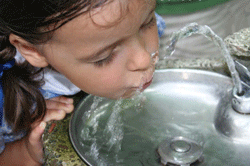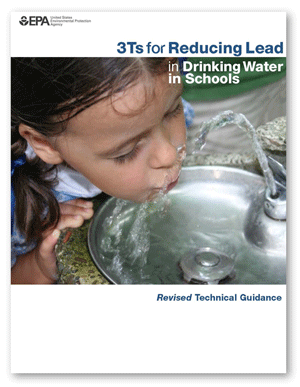| FAQ | Interim Reports | Lead Poisoning Prevention |
Last Reviewed: July 20, 2016
For Schools Sampling Water for Lead

The Tompkins County Health Department recommends that schools that choose to sample water in their buildings for lead, follow the guidance from the EPA. That guidance is posted below. We recommend that schools call the Health Department before proceeding with testing.
It is important to read the document thoroughly and to adhere to this guidance closely in order to achieve accurate results. The Health Department also recommends that schools consult one of the laboratories listed here.
Health Department staff is available if you have questions about sampling water or health concerns related to lead. Please call us before proceeding with testing. Call (607) 274-6688
Guidance Documents
- 3Ts for Reducing Lead in Drinking Water in Schools. Revised Technical Guidance. US-EPA. 104 pages. (PDF, 1.77MB) — RECOMMENDED —
- Lead and Copper Rule: A Quick Reference Guide for schools and child care facilities that are regulated under the safe drinking water act. US-EPA. 5 pages. (PDF, 369KB)
- Drinking Water Best Management Practices for Schools and Child Care Facilities With Their Own Drinking Water Source. US-EPA, April 2013. 24 pages. (PDF, 843KB)
- Local Water Testing Labs (PDF)
- Supplemental Lead Sampling Procedures for Schools
- Chain-of-Custody: How to document during sampling
- Lead Exposure Risk Assessment for Children, Questionnaire
 Water Testing Information documents posted on the Ithaca City School District website Click Here
Water Testing Information documents posted on the Ithaca City School District website Click Here
F.A.Q. related to potable water and lead
NOTE: For information more directly related to household water, please visit this page.
Health Concerns
I received a notice from the ICSD that testing results revealed that there were elevated lead levels in my child’s school. Should I have my child tested?
- If you are concerned that your child may have elevated blood lead levels from the drinking water at school, you should contact your child’s pediatrician or health care provider. Your doctor knows your child’s medical history and can advise you whether or not your child should be tested.
- Have there been children who have had elevated blood lead levels from drinking water?
There is no history of any children in Tompkins County who have had elevated blood lead levels from drinking water.
- Does this include children from ICSD where elevated lead levels in drinking water have been revealed recently?
Local providers report that more than 100 children from the ICSD have been tested for elevated blood lead levels. There have been no cases of elevated blood levels due to drinking water.
- What about hand washing at schools where there have been elevated lead levels?
Lead is not absorbed through the skin through hand washing, bathing, or showering. In fact, hand washing should continue to be encouraged to prevent illnesses such as colds and flu, Children should wash their hands before eating and after going to the bathroom.
Lead in Drinking Water
- Elevated lead levels were found in the drinking water in Enfield and Caroline schools. What is the plan to correct those high lead levels?
Drinking water was tested in Enfield and Caroline Elementary Schools in January after testing done in August revealed elevated lead levels. In January the Ithaca City School District (ICSD) replaced fixtures at some locations that showed lead levels at or above the permitted action level of 15 parts per billion. This often reduces lead levels in the water under the action level. When another round of sampling was done in February the results came back inconclusive — some areas were better and some were not. Possible causes of elevated levels include plumbing within the system or inconsistencies in sampling procedures. That is why the Tompkins County Health Department is working with the New York State Department of Health to determine the meaning of these recent results.
In the mean time, the ICSD has turned off all drinking water sources in school buildings until another round of lead testing is completed. Bottled water is being supplied for drinking. Lead is not absorbed through skin and is safe for washing hands, bathing, or showering.
- Why was the drinking water tested in Caroline and Enfield schools?
Those schools are required to test drinking their water because the water is supplied by on-site wells, i.e., their own water systems. These are the only two schools in the ICSD that maintain their own water systems. Schools that receive water from municipal suppliers are not required to test their drinking water. Water is tested at representative sites by the supplier.
- How does lead occur in drinking water?
Lead seldom occurs naturally in water supplies like rivers and lakes. Lead enters drinking water primarily as a result of the corrosion, or wearing away, of materials containing lead in the water distribution system and household or building plumbing. These materials include lead-based solder used to join copper pipe, brass and chrome-plated brass faucets, and in some cases, pipes made of lead that connect houses and buildings to water mains. In 1986, Congress banned the use of lead solder containing greater than 0.2% lead, and restricted the lead content of faucets, pipes and other plumbing materials to 8.0%. Older construction may still have plumbing that has the potential to contribute lead to drinking water. (NYSDOH). Prior to 2014 the law allowed end-use brass fixtures, such as faucets, with up to 8% lead to be labeled as “lead free,” after 2014 this limit was lowered to 0.25% Visit the National Sanitation Foundation Web site at www.nsf.org to learn more about lead-containing plumbing fixtures.
- How do I learn about the quality of the water supplied to my house?
Public water systems are required to provide their users with Annual Water Quality Report (AWQR). If your water is supplied by a municipal supplier, contact them for this report. Lead and copper results for the most recent sampling can be found in this report. Community suppliers (not connected to municipal water systems) — those that supply water to at least 25 people in residences such as apartment buildings in rural areas — are also required to provide their users with an AWQR.
The AWQR for the City of Ithaca, Cornell and Bolton Point water systems may be found at the Bolton Point website: boltonpoint.org/2016.pdf
- If the cause of elevated lead levels is often fixtures, how do I have the water tested at my house?
Brass faucets, fittings, and valves, even including some advertised as “lead-free", may contribute lead to drinking water. Prior to 2014 the law allowed end-use brass fixtures, such as faucets, with up to 8% lead to be labeled as “lead free,” after 2014 this limit was lowered to 0.25% Visit the National Sanitation Foundation Web site at www.nsf.org to learn more about lead-containing plumbing fixtures.
Home water testing: If you choose to test the water at your home, contact one of the laboratories on the list posted on this website (click here). They will provide information, sampling instructions and containers for proper testing. You may also call the Tompkins County Health Department for more information on testing at (607) 274-6688.
- How can I reduce my exposure to lead that may be in the drinking water if I choose not to have the water tested in my home?
Run water for 15-30 seconds or until it becomes cold or reaches a steady temperature before using it for drinking or cooking, if it hasn’t been used for several hours. This reduces the concentration of lead-containing water from the pipes.
Do not cook with or drink water from the hot water tap; lead dissolves more easily into hot water. Do not use water from the hot water tap to make baby formula. Boiling water will not reduce lead concentration.
Caroline & Enfield Elementary Schools Interim Lead Test Reports
- Interim Report for Caroline Elementary School (PDF, 1.5MB)
- Interim Report for Enfield Elementary School (PDF, 2.4MB)
- Press Release, April 14, 2016
Health Department Communications
- Letter to School Districts (Feb. 19, 2016)
- Letter to Parents and Caregivers (Feb. 19, 2016)


